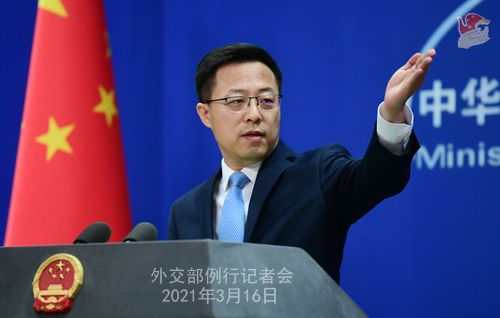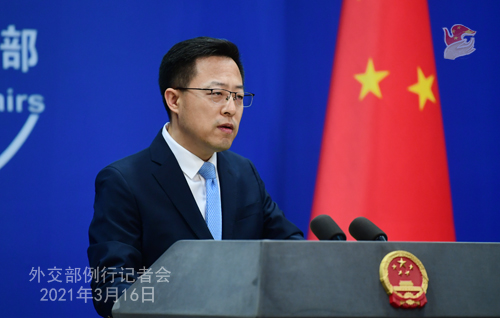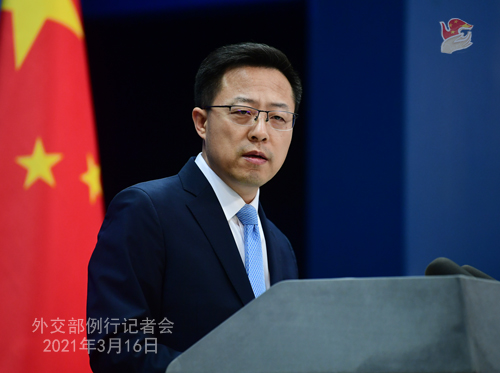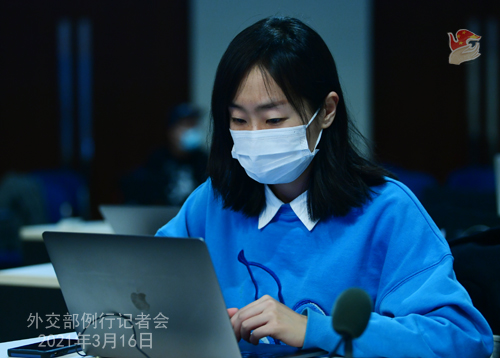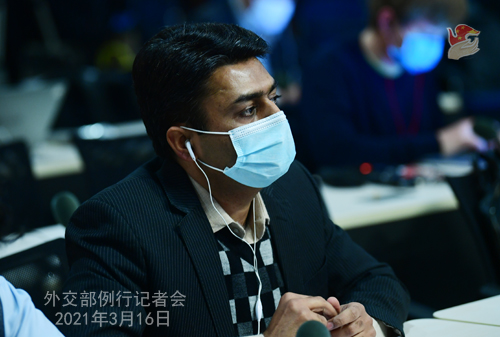| Foreign Ministry Spokesperson Zhao Lijian's Regular Press Conference on March 16, 2021 |
| 2021-03-16 18:59 |
|
CCTV: On March 15, Ambassador Zhang Jun, Permanent Representative of China to the United Nations, sent a letter to UN Secretary-General António Guterres, informing him of China's decision to donate 300,000 doses of COVID-19 vaccines to UN peacekeepers, with priority given to the peacekeeping missions in Africa. Do you have any comment on this? Zhao Lijian: Chinese State Councilor and Foreign Minister Wang Yi announced China's decision to donate vaccines to the United Nations peacekeepers at the UN Security Council Ministerial Open Briefing on COVID-19 Vaccine Issue in February. Recently, the Chinese government has decided to donate 300,000 doses of COVID-19 vaccines to UN peacekeepers, with priority given to the peacekeeping missions in Africa. This is a further step to follow up on President Xi Jinping's pledge to make China's vaccines a global public good, a demonstration of China's support to the UN and multilateralism, the great importance China attaches to and its care for the safety and security of peacekeepers. The Permanent Representative of China to the United Nations sent a letter to UN Secretary-General yesterday to inform him of this decision. As one of the champions of safety and security issue under the "Action for peacekeeping" (A4P) initiative of the UN Secretary-General, China values highly the safety and security of peacekeepers, and supports early COVID-19 vaccination for UN peacekeepers to protect their health and help them better perform their duties. The Chinese side will work closely with the UN Secretariat to make vaccines donated by China available to the UN peacekeepers at an early date. Beijing Youth Daily: ROK media citing the Korea Meteorological Administration (KMA) said that the recent dust storm affecting the country and causing its air quality to plummet originated from China. This has triggered heated discussion in both China and the ROK over the issue of environmental and air pollution. Do you have a comment? Zhao Lijian: This topic is nothing new. Environmental and air pollution issues can cross borders easily. Science-based monitoring and comprehensive analysis is needed to reach a conclusion on the origins. According to the analysis of Chinese monitoring authorities, the dust storm originated from outside China and China is only one stop on its route. I noted the information released recently by the Mongolian government on the hazardous dust storm. The Chinese public doesn't criticize Mongolia because it may be the previous stop. All sides should look at the matter in a science-based and constructive manner, guide public opinion toward the positive direction, and refrain from unnecessary hype-up or hasty labeling. I would also like to add that China attaches high importance to preventing, curbing and combating desertification. We've made visible progress, with a marked drop in dusty weather in recent years. This has not only benefited China, but also contributed to improving air quality in the region. This dust storm shows that there's much to be done in regional cooperation to improve the environment. We stand ready to join hands with neighboring countries and the international community to do a better job in improving and protecting the regional and global environment and contribute to the building of a more beautiful and cleaner world.
Bloomberg: US Secretary of State Antony Blinken meets officials in Japan today as part of efforts to find common ground to deal with China. Would the foreign ministry like to comment on this? Zhao Lijian: We believe that exchanges and cooperation between the US and Japan should help regional countries enhance mutual understanding and trust, strengthen solidarity and cooperation, and uphold peace and stability in Asia Pacific. Their interactions shall not target a third party or hurt the interests of a third party. Prasar Bharati: Regarding China's announcements on visa facilitation in certain countries where Chinese vaccines are not being used, I'd like to understand what are the purpose and utility of these announcements. Has China approached these countries for recognizing Chinese vaccines? If not, then who do you think will benefit from these announcements? Zhao Lijian: So far, many countries and international organizations have floated the idea of linking vaccination status with opening up international travels. Some have already rolled out specific arrangements to implement such ideas. Our proposal to facilitate the travel of those who have been inoculated with Chinese vaccines is made after thoroughly considering the safety and efficacy of Chinese vaccines. We believe this is a meaningful exploration of facilitating international travel once mass vaccination has been achieved. It is not linked to the recognition of Chinese vaccines. Follow-up: That's fine. It's a meaningful attempt to open up the travels. But if the Chinese vaccines are not available at all in these countries, and China is not approaching those countries for using the Chinese vaccines, then how can anybody from those countries get inoculated by Chinese vaccines and get the benefit of the announcement? Also, would it not be better if China recognizes the WHO-approved vaccines, for most of Chinese vaccines are also in the process of approval by WHO? Wouldn't it be more useful? Zhao Lijian: I can understand what you were suggesting. But as I just said, China's proposal is a meaningful step we are trying to facilitate international travel. This is an arrangement made by the Chinese side unilaterally. It is a different thing from vaccine recognition. As to your question about China approving other countries' vaccines, I already stated China's position yesterday.
China Review News: A survey among U.S. tech employees conducted by U.S. media Protocol which focuses on technology said that 56 percent of the respondents agree that "U.S. restrictions on Chinese technology companies have gone too far." About 60 percent agree that U.S. tech companies should work more closely with their Chinese counterparts and 58 percent agree that "a Cold War with China could cripple U.S. tech companies." I wonder if you have a comment? Zhao Lijian: Global cooperation in science and technology, key engines driving socioeconomic development, is the common aspiration and the overriding trend. The United States has long benefited enormously from the open global cooperation in this area. Scientific exchange and cooperation between China and the United States serves the interests of both countries and peoples. The previous U.S. administration, in a bid to retain its monopoly in the scientific field, chose to politicize scientific matters, over-stretch the concept of national security and abuse state power, erecting walls, decoupling and cutting supplies. Such moves ran counter to the trend of the times and the market economy rules, hurt others and itself, and could only lead to self-isolation and backwardness. The new administration should heed the objective and rational voice of domestic enterprises, correctly view China's scientific progress and China-US ties in the scientific sector, stop unjustifiable suppression and restrictions targeting Chinese tech companies, provide an enabling environment for China-US exchange and cooperation in this field and jointly contribute to global scientific development. Bloomberg: AFL-CIO President Richard Trumka has demanded in a letter to US National Security Adviser Jake Sullivan that the Biden administration and Congress cut off imports of solar energy products from Xinjiang. Trumka singled out products that "contain polysilicon made with forced labor." Does the foreign ministry have a comment on this? Zhao Lijian: There is not a grain of truth in the absurd allegation that there is "forced labor" in Xinjiang. Such an allegation was made to hold back the development of the relevant Chinese side and Chinese companies. We have repeatedly offered facts and truth on multiple occasions. We hope that the relevant organization and companies on the US side will talk and act responsibly, not only for themselves but also for others, tell truth from falsehood, respect facts, trust and spread no rumors, and make the right choice that serves their own interests.
Shenzhen TV: Mr. Geir O. Pedersen, United Nations Special Envoy for Syria, said in his press remarks at the Security Council that "it is important that we establish this new international format, in a manner where we bring in all the different parties that have an influence on this conflict, so obviously it will have to involve, one way or the other, all permanent members of the Security Council." What is China's comment? It has been ten years since the beginning of the Syrian tragedy. What role has China played in resolving the Syrian issue? Zhao Lijian: In the past 10 years, Syria has been injured by illegal invasion and foreign occupation and maimed by terrorism and unilateral sanctions. National development has almost ground to a halt. There are profound lessons the international community can take from this tragedy, and an important one is that wanton interference in internal affairs and unjustified pressuring and sanctions bring nothing but misery. It is the Syrian people who own their future. The international community should support a Syria-led and Syria-owned political process, support Special Envoy Geir Pedersen's mediation efforts, and play a constructive role in an early political settlement of the Syrian issue. Over the past decade, on the basis of respecting Syria's sovereignty, independence and territorial integrity, the Chinese side has been promoting the political process in Syria and supporting the UN's mediation efforts. We maintain that terrorist forces in Syria must be uprooted and Syria's efforts to uphold national security and stability must be supported. We urge the relevant countries to lift their unilateral sanctions and illegal blockade over Syria and support Syria's efforts to improve its people's livelihood. China will continue to play a positive role in advancing an early, peaceful, just and proper settlement of the Syrian issue. Bloomberg: The encrypted messaging app Signal seems to have been blocked in China. Does the foreign ministry have a comment on this? Why does China block foreign social media platforms? Zhao Lijian: I'm not aware of what you mentioned and refer you to the competent authorities. I can reiterate our principled stance for you. China's internet is an open space which the Chinese government regulates in accordance with laws and regulations.
Bloomberg: A Biden aid has said that China-US ties will not improve until Beijing stops economic coercion of Australia. Does the foreign ministry have a comment on it? Zhao Lijian: China and the United States will hold a high-level strategic dialogue in the coming days. The two sides are still in discussion on the specific agenda. We hope that building on the spirit of the phone conversation of the two heads of state on the eve of the Chinese lunar new year, the two sides can have candid talks on issues of common concern. China will make its position clear on relevant issues during the dialogue. The two sides should respect and treat each other as equals, enhance mutual understanding through dialogue, manage and dissolve differences and bring China-US relations back to the right track. The Chinese side has stated on many occasions its views on China-Australia relations. The root cause of the current difficulties in bilateral relations is Australia's wrong words and deeds on issues concerning China's sovereignty, security and development interests, which have undermined the foundation of mutual trust and cooperation between the two countries. The Australian side knows the ins and outs better than anyone else. Bloomberg: Bloomberg has reported that the Chinese government is telling Alibaba to sell some of its media assets including the South China Morning Post in Hong Kong. Can you confirm this? Does China want a state-owned company to buy the South China Morning Post? Zhao Lijian: I'm not aware of what you mentioned and have no specific information for you. NTV: I have a question about the Japan-US foreign ministers' meeting. At the meeting, US Secretary of State Blinken mentioned China and Myanmar as countries based on different values from western countries. What is your comment on this? Zhao Lijian: I'd like to stress that democracy is a common value for all mankind. There is no set model to achieve democracy or standard answer. True democracy must be rooted in the local soil and serve the people. China upholds the socialist political democracy with the CPC's leadership, the people being the masters of the state and governing the country by law integrated. This is whole-process and most broad-based democracy that reflects the people's will, suits China's national reality, and has the endorsement of the people. China has made unique and important contributions to the progress in mankind's political civilization. As has been fully proven by facts, there is no such thing as a unified standard or version of democracy in the world.
|
| |||||||||||||||
|
|||||||||||||||



